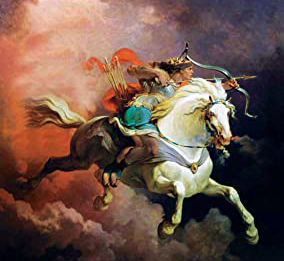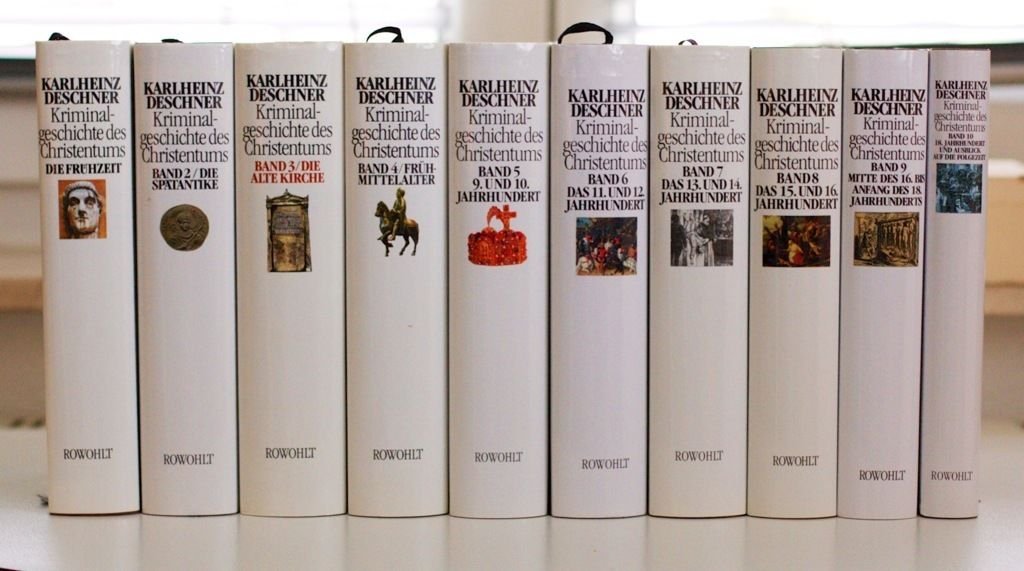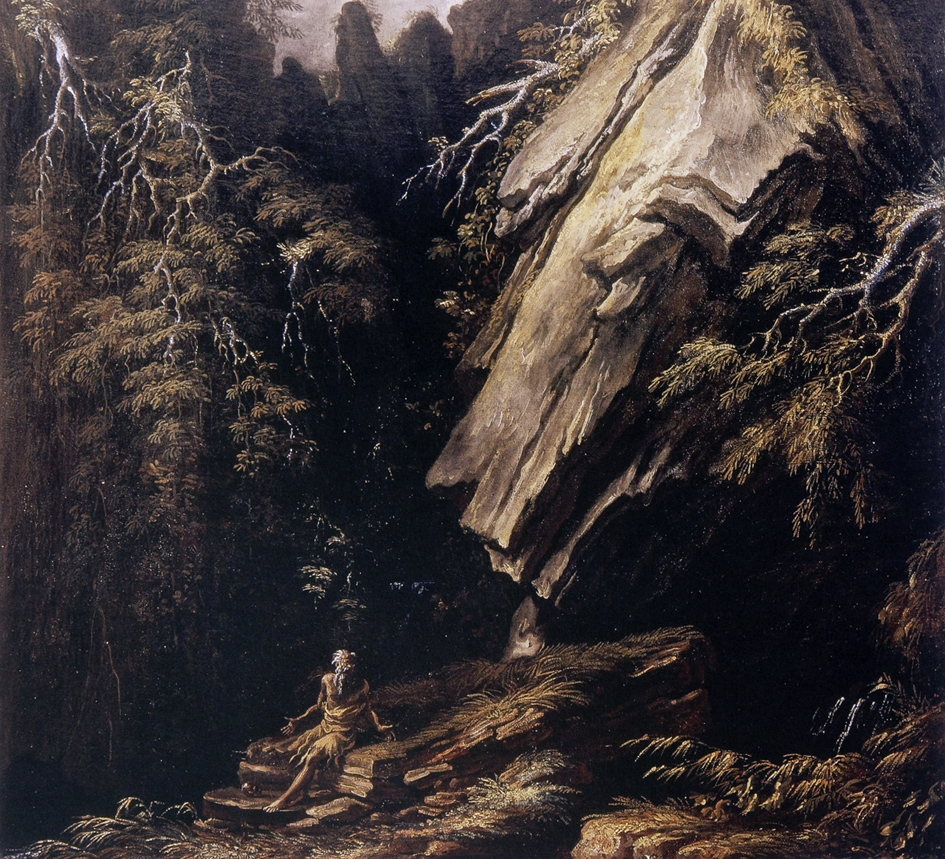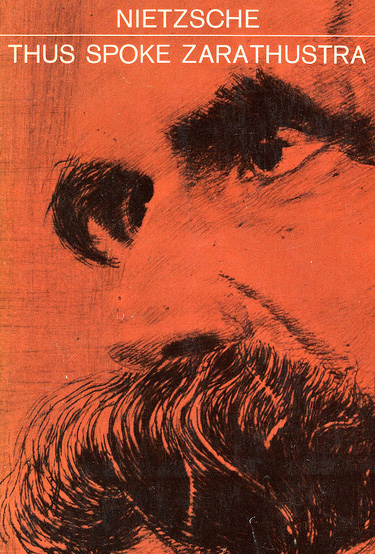He who has risen above time and who, in spite of this (or even because of it) has a mission to accomplish, sees fit to act in time, acts with the certainty of beings who do not choose; with that of the plant that grows towards the sun—what shall I say?, he acts as the magnet that attracts iron, or the elements that combine to yield the compounds that chemistry studies. With consciousness, certainly; but without deliberation or choice, since he clearly ‘knows’ and there is no choice except for the consciousness that doesn’t know, or that knows only imperfectly. (One doesn’t ‘choose’ between the two propositions ‘Two and two make four’ and ‘Two and two make five’. We know that the first is true, the second false. Nor do we ‘choose’ to think that an object is white, if we see it as such. We feel unable to make any judgement about it that would exclude its ‘whiteness’).
What can encourage a decision by someone who is still a prisoner of time—who doesn’t ‘know’, who doesn’t ‘see’, what the future will be to which he contributes, and who has the impression that he can ‘choose’ his action? What could motivate him, especially if he is ignorant of the whole future yet knows that it will go against him, what is dearest to him in the world, and that his action is, on a practical level, perfectly useless? What could sustain the attitude of men like Teia, last king of the Goths in Italy? Or like the Amerindian princes and warriors, who, in spite of the decree of their own gods, deciphered in the heaven by the sages of their lands, fought all the same, albeit too late—and with desperate heroism—against the Spaniards? Or, closer to us, like those thousands of Germans and Aryans from all over the world who, even though they knew that all was lost, even though there were only a few square metres left of the great National Socialist Reich that had been shelled by Russian artillery, continued to fight, one against five hundred, like lions? [1]
What can sustain them in their action, in their refusal to give in, in their defiance, in their useless attitude—not a martyr who foresees, beyond death, a future of beatitude which will compensate him for the worst torments in this world, but these iron winds of all lost causes which, who have no hope either in this world or in any other—who are not even enlightened enough to imagine the triumph of their truth at the dawn of a future time cycle and who, humanly speaking, should feel that they fight, suffer and die for nothing? What can they oppose to this nothingness that is worth all the sacrifices?
They can—and do, no doubt, if only in their subconscious—oppose it with the only certainty that remains when all else collapses: that of the irrevocability of the past.
For them, it is no longer a question of the future of their people and of the world, over which they will have no influence. It is even less about their personal future, which has long ceased to interest them. It is about the beauty of the moment they are going to live, right now, in a second, in an hour, whenever; it is about the beauty of that moment which represents, in endless time, the last scene of their struggle, a moment which, as soon as it has been lived, will take on that unshakeable stability which is the very essence of the past; which will still ‘exist’, in the manner of the whole past, millions and billions of years hence, when there will be no memory of it on earth for a long time to come: when there will be no more earth; no more solar system; when all the visible worlds of today will have ceased to exist materially.
They feel that this moment is all that still depends on them; all that is yet given to them to create. They feel that it is in their power to make it beautiful, or ugly: beautiful, if it fits into the very structure of their being, like the perfect detail that crowns a work of art, the last perfect phrase of a musical composition. Ugly, if it contradicts it, if it betrays it; if, far from completing and crowning it, it robs it of its value; if it destroys it, just as a last brushstroke can turn a smile into a grimace, or a drop of impure liquid can stain, destroy forever, the most exalting of perfumes.
They feel—they know—that it depends on them to make it beautiful or ugly, depending on whether they proclaim, and proclaim for eternity, their honour or their shame; their fidelity to their true raison d’être, or their disavowal. For what is it to disavow, as soon as they become unpopular, the principles that one has professed, a king or a leader whom one has pretended to love and serve as long as there was some tangible advantage in doing so? This is not to prove that one ‘took the wrong path’—otherwise one would have changed it sooner—but it shows that one values effort only for attaining purchasable comfort and pleasures, and that one is incapable of disinterested allegiance, not only to the leaders one has betrayed, but to anyone else; that one has neither honour nor courage, in other words, that one is not ‘a man’ even if one has human form. For a coward is not a man.
The horror of an eternity of ugliness—for the revulsion of a man of honour before a degrading action or attitude is nothing else— is perhaps more decisive even than the aspiration of the faithful one, vanquished on the material plan, to remain himself after the defeat. In fact, if it is rare that a man who knows himself before circumstances reveal his true scale of values, he at least knows himself, to a certain extent, negatively.
If he doesn’t know, in general, what he is capable of, at least he has—and this, apparently, from the moment of the awakening of his self-consciousness—a fairly clear idea or feeling of things that he would never do; of some attitudes that could never be his, whatever the circumstances. The man of good breeding spontaneously shrinks before a degrading action or attitude. He feels that once it has been done, or taken—once it has become part of the past, henceforth unchangeable feeling—it would mark him for eternity, in other words, it would sully him and scar him irreparably. And it is against this projection of his degraded ‘self’—against this contrast between the nobility, the beauty he feels in himself, and the image he has of the ugliness, inseparable from all cowardice, that his fallen being would put on—that he revolts. Anything, rather than this! Anything rather than to become so repellent!—and that forever, for no contrition can erase what once was; no forgiveness can change the past.
And what can be said of the vanquished of this world who act ‘against Time’—that is to say, futilely, from viewpoint of his hostile surroundings—is also true of those to whom all action properly speaking is forbidden, even though they have not necessarily transcended the temporal realm, and who continue to live, day after day, for years and decades, in the spirit of a doctrine that is against the current of Time.
They leave, by the mere unfolding of their existence, with their increasingly impeded expression, an unwritten page of History. The humblest of them could claim a spiritual kinship, distant, no doubt, but undeniable, with certain illustrious figures: with a Hypatia, in the Alexandria of the 4th and 5th centuries, increasingly controlled by Christianity; with a Pletho, in the 15th century, in the atmosphere of Byzantine Hellenism, all steeped in Christian theology.
He could, in his moments of depression, think of all those who, in a forced, almost complete inactivity—or a phantom of activity, that their persecutors try to render useless—continue, in an indefinite captivity, to be the most eloquent witnesses of their faith. (As I write these lines I am thinking of Rudolf Hess and Walter Reder, the former locked up for thirty years, the latter for twenty-seven, behind prison bars.)[2] He could rightly say to himself that he is, that his brothers in the faith are, and that forever; that everything they represent is extended in them, already in our visible and tangible world.
Ancient Hellenism lives on in Pletho, as well as in some other men of the 15th century, insofar as they preserved its spirit. In the same way, the ‘real Germany’, that is to say, the Germany which has, in Hitlerism, rediscovered its original spirit, lives in the cell of Rudolf Hess—and more invincibly than anywhere else, certainly, since the captive of Spandau is one of the spiritual initiators of the more-than-political movement that the ‘Party’ represented in its origins, and probably one of the Führer’s co-initiates.
It also lives on—their truth and vision—in Walter Reder and in all the faithful Germans still in captivity, if there are any, as well as in the immortal figures of the irrevocable past, such as Dr. Joseph Goebbels and his wife, who in their spectacular demise carried along the six children that they had given to the Third Reich rather than letting them survive it. Not to mention the Führer himself, whose whole life is that of Man both ‘out of Time’ and ‘against Time’—out of Time if we consider him from the viewponut of knowledge, against Time (against the current of universal decadence, which is increasingly evident at the end of our cycle), if we speak of him from the point of view of action. But I would add that unless one has transcended Time through direct awareness of ‘the original meaning of things’[3] it is impossible to draw millions of people, even for a few short years, into a struggle against the general trend of temporal manifestation, especially near the end of a cycle.
______ 卐 ______
Editor’s Note: This perfectly explains my loneliness in the raven cave behind the Wall during Westeros’ darkest hour.
______ 卐 ______
He who, still trapped in the ‘before’ and ‘after’, cannot objectively relate his action or attitude to the ‘original meaning of things’, can only justify himself by the beauty of that episode of unwritten history that is, and will remain, even if unknown forever, his own history. The awareness of this beauty of something that nothing can destroy is the most exhilarating thing for the individual—all the more so because all beauty is, even if he doesn’t realise it, the radiation of a hidden truth.
But as a lived experience, it concerns only him and those who accept the same values. It may be enough for him. For many of them, this immutably beautiful past will soon be only a past. Only he who, having risen out of Time, knows that his action ‘against Time’ reflects the truth of all time—the truth, whose Source is the divine order—can transmit to multitudes not this truth (which is incommunicable and moreover would not interest them) but his faith in the necessary action; his conviction that his fight against the inverted values long preached and accepted, against erroneous ideas, against the reversal of the natural hierarchies, is the only one worthy of all sacrifice.
Only he can do this because he has, at the same time as the joy of the fight, even if practically useless, on behalf of a true idea, the vision of our historical cycle in its place in the indefinite rhythmic unfolding of all cycles, in the ‘eternal Present’; because there is, in the objectivity of this vision, a light capable of being projecting, be it only for an instant—a few years—onto our world, like a glimmer heralding the dawn of the next cycle; a force capable for an instant of holding it back in its race toward disintegration.
The multitudes are seduced by this light, and feel this force—but not for long. Every mass is, by nature, inert. The man of vision, Adolf Hitler, for a time drew the privileged crowds to him, as a magnet draws iron. They felt that they had a God as their leader: a man in touch with the ‘original’ (eternal) ‘meaning of things’. But they didn’t understand him. With him gone, they became modern crowds again. They remained, however, marked in their substance by the memory of a unique experience, and imbued with an immense nostalgia: a nostalgia that the whirlwind of life haunted by the idea of money, production, comfort and over-saturated with purchasable pleasures cannot dispel. I have been told that more than thirteen thousand young people commit suicide every year in western Germany alone.
Fortunately, there are also young people who, knowing full well that they will never see the equivalent of what the Third Reich was, live with courage and conviction the faith against the tide of time—the faith in the eternity of the Race, the concrete symbol of the eternal beyond the visible and transcendent world—that the Führer left to them in his so-called ‘political’ testament. They live it with courage and without hope, in the manner of the Strong who need neither support nor consolation. When these young people, who are now twelve, fifteen or eighteen years old, have become old men and women, those of them who will have remained unwaveringly faithful all the days of their existence—in thought, in their silence, in their speech, whenever possible by their behaviour in the ‘little things’ as well as in the big ones—those, I say, will be able, even without ever rising above the ‘before’ and the ‘after’, to look at this page of unwritten history which their life will represent, and to be satisfied with it as with a work of beauty. To this page, their children will add another. And the faith will be passed on.
There are, finally, some very few faithful ones who, sensing in the Führer’s teaching a more-than-political doctrine, devote themselves to its study in order to discover what makes its unshakeable value independently of the lost war and the tenacious hostility of the whole world, conditioned by the enemy. They gradually realise that Hitlerism—Aryan racism in its past and present expression—is, stripped of the contingencies that marked its birth, nothing other than a path, which implies in its Founder the vision, in all those who follow him in spirit, the acceptance of the metaphysical truths at the basis of all ancient traditions, in other words, of the supreme truth.
And they strive to come closer to the departed Leader, by coming closer to the One he was indeed: to the One who, in the Bhagawad-Gita, teaches the Aryan Warrior the mystery of union with the infinite Self through violent action, freed of any attachment; to the One who returns from age to age to fight ‘for Justice’, i.e., for the restoration of the divine order against the tide of Time. In other words, they seek the eternal, certain that only they will find it.
_________
[1] Among others, the French members of the Waffen S.S., who defended Berlin to the end.
[2] This sentence was written in December 1970.
[3] ‘der Ursinn der Dinge’ (Mein Kampf, ed. 1935 p. 440).







